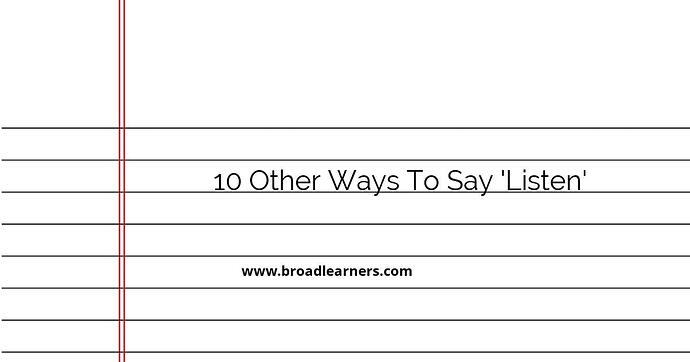Listening is an essential skill in effective communication. However, using the same word over and over can become monotonous. So, if you're looking for alternative ways to say 'listen,' we've got you covered.
- Pay attention
- Give ear to
- Be all ears
- Take note of
- Attend to
- Give heed to
- Absorb
- Take in
- Hear out
- Observe
Now, let's dive into each alternative and explore examples to help you understand their usage.
1. Pay attention
'Pay attention' is a common phrase used to emphasize the need for concentration and focus. It implies giving someone or something your full mental presence.
Example: Pay attention to the instructions so that you don't miss any important details.
2. Give ear to
'Give ear to' is a more formal way of saying 'listen.' It suggests actively lending an ear to someone's words or advice.
Example: Give ear to his wise counsel; he has valuable insights to share.
3. Be all ears
This idiom means to be fully attentive and ready to listen. It conveys eagerness to hear what someone has to say.
Example: I'm all ears. Please share your thoughts with me.
4. Take note of
'Take note of' implies acknowledging and remembering information. It emphasizes the importance of paying close attention to details.
Example: Take note of the key points mentioned in the presentation.
5. Attend to
'Attend to' means to give one's attention to a specific task or person. It suggests a sense of responsibility and dedication.
Example: Please attend to the customer's needs promptly.
6. Give heed to
'Give heed to' means to take someone's advice or warning seriously. It implies acting upon the information received.
Example: Give heed to your mother's advice; she always knows best.
7. Absorb
'Absorb' suggests fully immersing oneself in what is being said or experienced. It implies grasping and understanding the information deeply.
Example: Absorb the knowledge shared in this workshop; it will benefit you greatly.
8. Take in
'Take in' means to receive and comprehend information. It emphasizes the act of understanding and internalizing what is being communicated.
Example: It takes time to take in all the details of a complex concept.
9. Hear out
'Hear out' means to listen attentively and allow someone to speak without interruption. It suggests valuing and respecting the speaker's perspective.
Example: I want to hear you out before making any decisions.
10. Observe
'Observe' implies actively watching, listening, and paying attention to details. It involves not only hearing but also analyzing and understanding what is happening.
Example: Observe how she handles difficult situations; there's much to learn from her.
Did I miss anything? Respond below
